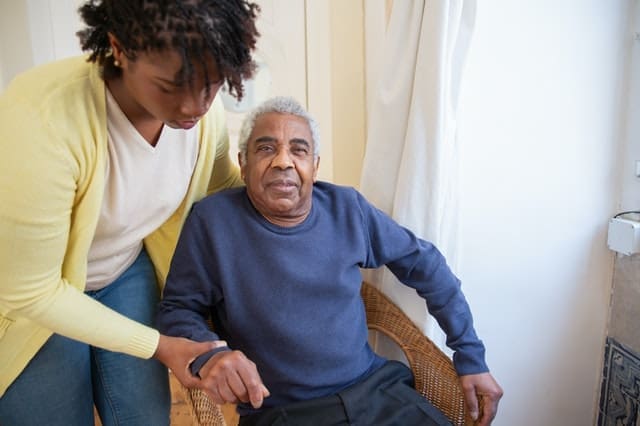Home to over 2.65 million professional carers providing essential care for their loved ones, Australia is working hard to ensure that professional carer support services are more widely available and accessible. If you’re a carer, it’s essential to find out what support is available in your area to help you emotionally and financially. Here’s our guide to where you can find professional help and support as a carer.
Am I Classed as a Carer?
Do you provide unpaid care for a friend or family member? Is this person unable to get by in their day-to-day life without your assistance due to a disability, a medical condition, or frail age? If you answered yes to both of these questions, you qualify as a carer. Carers make up approximately 11% of Australia’s population. They are an invaluable part of our society, helping some of our most vulnerable citizens stay at home in their community while receiving the love and care they need.
The tasks and roles can vary considerably from one case to the next. Some carers may need to provide a lot of physical assistance, washing, dressing, preparing food, and transporting their loved one to medical appointments. Other tasks may include supervising your loved one’s finances, preparing food and shopping, completing household tasks such as laundry and cleaning, plus providing an open heart and ear, being ready to support them, and listening to their needs.

Where Can I Get Help?
While there are numerous carer support services available, if you are not familiar with the Carers Gateway or other prominent government and official body websites, you may struggle to find out what kind of professional help is available. for a carer
For more information on where to get help, look at Services and Programs for Carers by Services Australia. You can also visit Carer Support Services at Carers Australia, as well as the Carers Gateway and other government sites. If you struggle to find the support you need online, you can call the Carers Gateway on 1800 422 737.
Local support groups can also be an invaluable aid for emotional support and provide you with practical help and advice.
Are Carers Eligible for Financial Support?
Aside from programs and services providing advice and support, carers may also be eligible for financial support depending on their circumstances and those of the person they are caring for. Here are some of the main payments that carers can apply for:
- Carer Payment – this fortnightly payment is an income support payment designed to help compensate carers who care for someone full time financially.
- Carer Allowance – a fortnightly payment. This income supplement is for carers who provide daily care to someone with a disability or chronic medical condition.
- Carer Supplement – an annual payment that some carers can benefit from if they are eligible, provided they already receive certain payments.
- Child Disability Assistance Payment – an annual payment for carers of a child with a serious medical condition or disability who receive the Carer Allowance.
- Essential Medical Equipment Payment – an annual payment to help to cover the expenses of running essential medical equipment or medically-required cooling or heating.
Carers may also qualify for other financial aid depending on their exact circumstances. To find out more about each payment and to apply or check your eligibility, contact your local Centrelink office or visit their website and set up an account.
Can I Take a Break from Caring?
Everyone needs a break from time to time and acres are no different. As caring for a loved one can easily take over all aspects of your life, it’s important to take a break from time to time to relax, rest and recuperate. You may want to take a holiday and travel. Alternatively, you may wish to spend time at home with the person you are caring for with some assistance for a couple of days so you can spend some extra time on any projects or just taking time out.
You can take up to 63 days of respite per calendar year and still receive your carer payments. You can organize respite care with friends or family or arrange for a professional carer to come out or for your loved one to spend some time in a respite care home, depending on their needs.
Taking Better Care of Yourself as a Carer
Taking care of someone else’s daily needs can very easily take over your own. Carers are often so accustomed to tending to their loved one’s needs that they may put off doing non-essential activities for their enjoyment, especially if it’s something that they would not share with the person they care for.
As a carer, it’s really important to make time for yourself. While it can seem like a daily struggle to get everything done, you should make an effort to treat yourself to some free time to spend either just relaxing or pursuing a favorite hobby or pastime. Joining a carer support group can be a real eye-opener for new full-time carers with personal advice on finding a balance in your life between caring, working, and living.
Remember, if the tables were turned and your loved one was caring for you, you would want them to do the things they love. So don’t feel bad about taking a little time to pursue your interests. Ask for help when you need it or when it’s offered. Keeping in touch with family members and friends will help ensure that they are up to date on the situation should they be available to help out occasionally.
Summary
Whether you’re caring for someone full-time or helping out a friend with daily tasks, it’s important that carers receive adequate support to enable them to take good care of their loved ones. Carers often have to make important financial and personal sacrifices to look after the people they care for. At Carers Australia, we provide a voice for carers across the nation on a national level. Carers provide an invaluable, often underrated service, and we actively lobby for change to ensure that Australian carers have the same rights as non-carers.
Featured Featured




